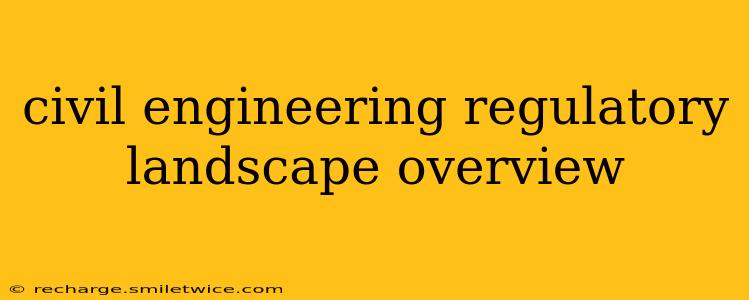The civil engineering profession is a cornerstone of modern society, responsible for designing, constructing, and maintaining the infrastructure that underpins our daily lives. This critical role necessitates a robust regulatory framework to ensure public safety, environmental protection, and the ethical practice of engineering. This overview delves into the complexities of the civil engineering regulatory landscape, exploring key aspects and addressing common questions.
What are the main regulatory bodies for civil engineers?
The regulatory landscape for civil engineers varies significantly depending on geographical location. In many countries, professional engineering is regulated at the state or provincial level, not nationally. Key bodies typically include:
-
Professional Engineering Licensing Boards: These boards are responsible for licensing and regulating the practice of engineering within their jurisdiction. They establish educational requirements, licensing exams (often involving the Fundamentals of Engineering (FE) and Professional Engineering (PE) exams in the US), and continuing professional development (CPD) mandates. They also handle disciplinary actions against engineers who violate ethical codes or professional standards.
-
National Engineering Societies: While not directly regulatory, organizations like the American Society of Civil Engineers (ASCE) or the Institution of Civil Engineers (ICE) in the UK play crucial roles in setting ethical standards, promoting best practices, and advocating for the profession. Their codes of ethics and guidelines significantly influence regulatory decisions.
-
Government Agencies: Various government agencies at the local, state/provincial, and federal/national levels also influence the regulatory landscape. These agencies often set building codes, environmental regulations, and safety standards that directly impact civil engineering projects. Examples include departments of transportation, environmental protection agencies, and building inspection departments.
What are the key aspects of civil engineering regulation?
Civil engineering regulation centers around several key pillars:
-
Licensing and Certification: The process of becoming a licensed professional engineer typically involves rigorous education, examinations, and experience requirements, demonstrating competency and commitment to ethical practice.
-
Ethical Codes and Conduct: All professional engineering organizations have strict ethical codes guiding professional behavior. These codes emphasize public safety, honesty, integrity, and the responsible use of engineering knowledge.
-
Standards and Codes: Numerous standards and codes (e.g., building codes, design standards, safety regulations) govern the design and construction of civil engineering projects. Adherence to these standards is crucial for ensuring safety and quality.
-
Professional Development: Continuous learning and development are essential for maintaining professional competence. Most regulatory bodies mandate continuing professional development (CPD) for licensed engineers to stay abreast of advancements and best practices.
-
Disciplinary Actions: Regulatory bodies have the power to investigate complaints, impose penalties, and even revoke licenses for engineers who violate ethical codes or professional standards. This is critical for protecting public safety and maintaining the integrity of the profession.
What education and experience are required to become a licensed civil engineer?
The specific educational and experiential requirements to become a licensed civil engineer vary significantly by jurisdiction. However, common elements include:
-
ABET-Accredited Degree: In many regions, an accredited Bachelor of Science degree in Civil Engineering or a closely related field is a prerequisite.
-
Engineering Fundamentals Exam (FE): This exam assesses fundamental engineering knowledge.
-
Professional Engineering Exam (PE): This exam, usually taken after gaining relevant experience, tests advanced knowledge and practical application in a chosen engineering discipline.
-
Years of Experience: A specified number of years of supervised professional experience under a licensed engineer is typically required before licensure is granted. This period allows for practical application of theoretical knowledge and mentorship.
What is the role of continuing professional development (CPD) in civil engineering regulation?
CPD is vital for maintaining competence and staying current with technological advancements, new regulations, and evolving best practices. Regulatory bodies typically require licensed engineers to demonstrate participation in CPD activities, such as attending conferences, taking courses, or engaging in professional development programs. This ensures engineers are equipped to handle the challenges and complexities of modern civil engineering projects.
How are ethical violations handled in the civil engineering profession?
Ethical violations are taken very seriously within the civil engineering profession. Complaints are usually investigated by the relevant licensing board, which may impose penalties ranging from reprimands to license suspension or revocation. The severity of the penalty depends on the nature and severity of the violation. Transparency and accountability are essential elements in handling such cases.
The civil engineering regulatory landscape is multifaceted and dynamic. Understanding its intricacies is crucial for both practicing engineers and the public to ensure the safety, reliability, and sustainability of our infrastructure. Staying informed about relevant regulations and ethical guidelines is vital for all involved in this critical profession.
